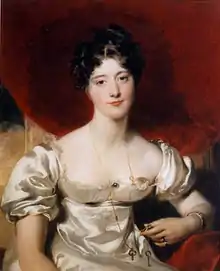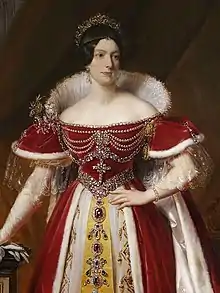The Marchioness of Londonderry | |
|---|---|
 The engagement painting of Lady Frances Anne Vane-Tempest by Sir Thomas Lawrence, 1818 | |
| Born | 17 January 1800 St James's Square, London, England |
| Died | 20 January 1865 (aged 65) Seaham Hall, County Durham, England |
| Nationality | British |
| Spouse(s) | |
| Issue | George Vane-Tempest, 5th Marquess of Londonderry Frances Anne Churchill, Duchess of Marlborough Alexandrina Dawson-Damer, Countess of Portarlington Lord Adolphus Vane-Tempest Lady Adelaide Emelina Caroline Vane Lord Ernest McDonnell Vane-Tempest |
| Father | Sir Henry Vane-Tempest, 2nd Bt |
| Mother | Anne MacDonnell, Countess of Antrim |
Frances Anne Vane, Marchioness of Londonderry (17 January 1800 – 20 January 1865) was a wealthy Anglo-Irish heiress and noblewoman. She was the daughter of Sir Henry Vane-Tempest, 2nd Baronet. She married Charles William Stewart, 1st Baron Stewart. She became a marchioness in 1822 when Charles succeeded his half-brother as 3rd Marquess of Londonderry.
Life
Frances Anne was the only child of Sir Henry Vane-Tempest, 2nd Baronet, and his wife Anne MacDonnell, 2nd Countess of Antrim.[1][2][3] At her father's death in 1813, Frances Anne inherited extensive lands in northeast England as well as some property in County Antrim, Ireland. As much of her English land was in the Durham Coalfield, she had income from coal mining. In his last will and testament, her father had stipulated that she must retain the surname Vane and that whoever married her would have to adopt her surname in lieu of his own. [4]
In 1819 she married and became the second wife of Charles William Stewart, 1st Baron Stewart, who dutifully changed his name and became Charles William Vane. In 1822 she became a marchioness when her husband succeeded his half-brother Lord Castlereagh to become the 3rd Marquess of Londonderry. With her husband, she developed an extensive coal mining operation that included coal mines, a railway, and docks at Seaham.[5]
She became an object of affection for Tsar Alexander I after he happened to see her engagement portrait by Sir Thomas Lawrence.[6]
She sought to promote the political career of her eldest son, George Vane-Tempest, and was a patron of Benjamin Disraeli.[7]
She built Garron Tower north of Carnlough, County Antrim, as a summer residence for herself. [8]
When her husband died in 1854, she commissioned an equestrian statue showing him as a hussar,[9] which was unveiled in 1861 and still stands on the market place in Durham, England. The sculptor was Raffaelle Monti.
Through her daughter, Lady Frances Vane, wife of John Churchill, 7th Duke of Marlborough, she is the great-grandmother of Sir Winston Churchill.
Issue
- George Henry Robert Charles William Vane-Tempest, 5th Marquess of Londonderry (1821–1884)
%252C_Marchioness_of_Londonderry%252C_and_Her_Son%252C_George_1828_Thomas_Lawrence.jpg.webp) Frances Anne (1800–1865), Marchioness of Londonderry, and Her Son, George 1828 by Thomas Lawrence
Frances Anne (1800–1865), Marchioness of Londonderry, and Her Son, George 1828 by Thomas Lawrence - Lady Frances Anne Emily Vane (1822–1899); married John Spencer-Churchill, 7th Duke of Marlborough.
- Lady Alexandrina Octavia Maria Vane (1823–1874), godchild of Alexander I of Russia; married Henry Dawson-Damer, 3rd Earl of Portarlington.
- Lord Adolphus Frederick Charles William Vane-Tempest (1825–1864), politician; became insane, and had to be medically restrained.
- Lady Adelaide Emelina Caroline Vane (c.1830–1882); disgraced the family by eloping with her brother's tutor, Rev. Frederick Henry Law.
- Lord Ernest McDonnell Vane-Tempest (1836–1885), fell in with a press-gang and had to be bought a commission in the army, from which he was subsequently cashiered.

Frederick William Robert Stewart, 4th Marquess of Londonderry (1805–1872) was her stepson.
Ancestry
| Ancestors of Frances Vane, Marchioness of Londonderry | ||||||||||||||||||||||||||||||||||||||||||||||||||||||||||||||||||||||||||||||||||||||||||||||||||||||||||||||||||||||||||||||||||||||||||||||||||||||||||||||||||||||||||||||||||||||||||||||||||||||||||||||||||||||||||||||||||||||||||||||||||||||||||||||||||||||||||||||||||||||||||||||||||||||||||||||||||||||||||||||||||||||||||||||||||||||||||||||||||||||||||||||||||||||||||||||||||||||||||||||||||||||||||||||||||||||||||||||||||||||||||||||||||||||||||||||||||||||||||||||||||||||||||||||||||||||||||||||||||||||||||||||||||||||||||||||||||||||||||||||||||||||||||||||||||||||||||||||||
|---|---|---|---|---|---|---|---|---|---|---|---|---|---|---|---|---|---|---|---|---|---|---|---|---|---|---|---|---|---|---|---|---|---|---|---|---|---|---|---|---|---|---|---|---|---|---|---|---|---|---|---|---|---|---|---|---|---|---|---|---|---|---|---|---|---|---|---|---|---|---|---|---|---|---|---|---|---|---|---|---|---|---|---|---|---|---|---|---|---|---|---|---|---|---|---|---|---|---|---|---|---|---|---|---|---|---|---|---|---|---|---|---|---|---|---|---|---|---|---|---|---|---|---|---|---|---|---|---|---|---|---|---|---|---|---|---|---|---|---|---|---|---|---|---|---|---|---|---|---|---|---|---|---|---|---|---|---|---|---|---|---|---|---|---|---|---|---|---|---|---|---|---|---|---|---|---|---|---|---|---|---|---|---|---|---|---|---|---|---|---|---|---|---|---|---|---|---|---|---|---|---|---|---|---|---|---|---|---|---|---|---|---|---|---|---|---|---|---|---|---|---|---|---|---|---|---|---|---|---|---|---|---|---|---|---|---|---|---|---|---|---|---|---|---|---|---|---|---|---|---|---|---|---|---|---|---|---|---|---|---|---|---|---|---|---|---|---|---|---|---|---|---|---|---|---|---|---|---|---|---|---|---|---|---|---|---|---|---|---|---|---|---|---|---|---|---|---|---|---|---|---|---|---|---|---|---|---|---|---|---|---|---|---|---|---|---|---|---|---|---|---|---|---|---|---|---|---|---|---|---|---|---|---|---|---|---|---|---|---|---|---|---|---|---|---|---|---|---|---|---|---|---|---|---|---|---|---|---|---|---|---|---|---|---|---|---|---|---|---|---|---|---|---|---|---|---|---|---|---|---|---|---|---|---|---|---|---|---|---|---|---|---|---|---|---|---|---|---|---|---|---|---|---|---|---|---|---|---|---|---|---|---|---|---|---|---|---|---|---|---|---|---|---|---|---|---|---|---|---|---|---|---|---|---|---|---|---|---|---|---|---|---|---|---|---|---|---|---|---|---|---|---|---|---|---|---|---|---|---|---|---|---|---|---|---|---|---|---|---|---|---|---|---|---|---|---|---|---|---|---|---|---|---|---|---|---|---|---|---|---|---|---|---|---|---|---|---|---|---|---|---|---|---|---|---|---|---|---|---|---|---|---|---|---|---|---|---|---|---|---|---|---|---|---|---|---|---|---|---|---|---|---|---|---|---|---|---|---|---|---|---|---|---|---|---|---|---|---|---|---|---|---|---|---|---|---|---|---|---|---|---|---|---|---|---|---|---|---|---|---|---|---|---|---|---|---|---|---|---|---|---|---|---|---|---|---|---|---|---|---|---|---|
| ||||||||||||||||||||||||||||||||||||||||||||||||||||||||||||||||||||||||||||||||||||||||||||||||||||||||||||||||||||||||||||||||||||||||||||||||||||||||||||||||||||||||||||||||||||||||||||||||||||||||||||||||||||||||||||||||||||||||||||||||||||||||||||||||||||||||||||||||||||||||||||||||||||||||||||||||||||||||||||||||||||||||||||||||||||||||||||||||||||||||||||||||||||||||||||||||||||||||||||||||||||||||||||||||||||||||||||||||||||||||||||||||||||||||||||||||||||||||||||||||||||||||||||||||||||||||||||||||||||||||||||||||||||||||||||||||||||||||||||||||||||||||||||||||||||||||||||||||
References
- ↑ More letters from Martha Wilmot, edited by Edith, Marchioness of Londonderry and H. M. Hyde (1935)
- ↑ "International Genealogical Index". The Church of Jesus Christ of Latter-day Saints. Retrieved 27 August 2008.
- ↑ Letters of Disraeli to Lady Bradford and Lady Chesterfield, edited by The Marquess of Zetland (1923)
- ↑ "Whitehall, May 5, 1819". The London Gazette. No. 17480. 25 May 1819. p. 906.
...may, in compliance with the provisions of the last will and testament of the said Sir Henry Vane, Bart. from henceforth continue respectively to use the surname of Vane only, ...
- ↑ "A Brief History of Seaham Harbour". skylighters.org. Retrieved 27 August 2008.
- ↑ Vane-Temple-Stewart, Edith (1958). Frances Anne: The life and times of Frances Anne, Marchioness of Londonderry, and her husband Charles, third Marquess of Londonderry. New York: St. Martin's Press. p. 42.
By some accident the Emperor of Russia saw it, and having expressed the wish to buy it, they told him it was the picture of a Miss Stephenson.
- ↑ Letters from Benjamin Disraeli to Frances Anne, marchioness of Londonderry, 1837–1861, edited by Edith, Marchioness of Londonderry (1938), p.268
- ↑ Hill, George (1873). An Historical Account of the MacDonnells of Antrim. Belfast: Archer and Sons. p. 371.
- ↑ Equestrian statue, monument to the 3rd Marquess of Londonderry. "Durham, DUDU04, Statue, Monument to Third Marquis of Londonderry". Archived from the original on 18 June 2011. Retrieved 23 September 2018.
Bibliography
| Library resources about Frances Vane, Marchioness of Londonderry |
| By Frances Vane, Marchioness of Londonderry |
|---|
- Jeremiah William Summers, The History and Antiquities of Sunderland (J. Tate), 1858
- K. D. Reynolds, Vane, Frances Anne, marchioness of Londonderry (1800–1865), Oxford Dictionary of National Biography, Oxford University Press, September 2004; online edition, January 2008. Retrieved 29 August 2008
- Diane Urquhart, The Ladies of Londonderry: Women and Political Patronage (I. B. Tauris), 2007 ISBN 1-84511-410-8
- Purchasing Power of British Pounds from 1264 to 2007. Retrieved 29 August 2008